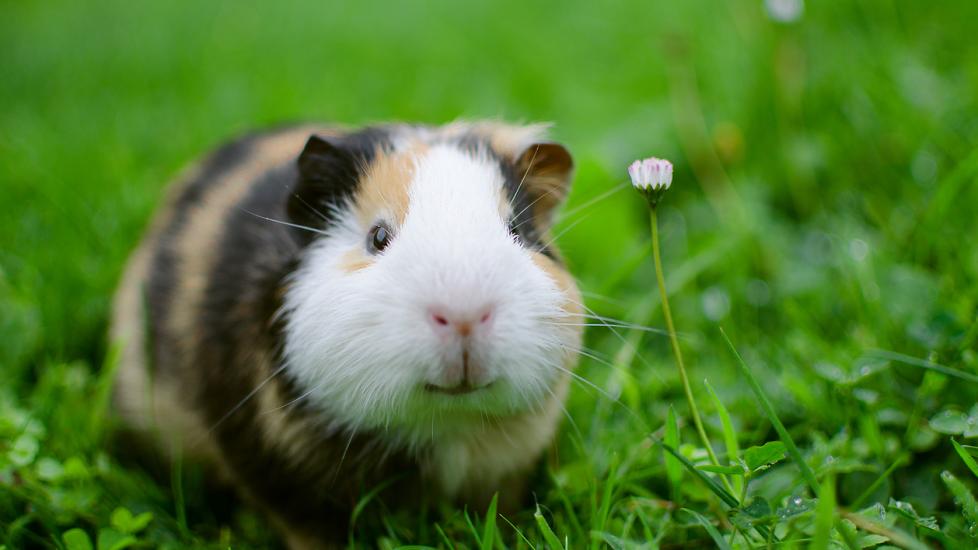Diarrhea in Guinea Pigs
What Is Diarrhea in Guinea Pigs?
Diarrhea is more common in young guinea pigs than adults, but it can happen at any age. It is essential to monitor and investigate your guinea pig’s poop daily. If you notice softer stools and watery diarrhea, call your veterinarian right away so your pet can be seen promptly.
Diarrhea can cause dehydration, loss of nutrients, and can get worse fast if it’s not treated swiftly. To prevent any spread of infectious agents, separate a guinea pig with diarrhea from other pigs until they are deemed safe to be around others.
Recommended Products
Symptoms of Diarrhea in Guinea Pigs
Guinea pigs experiencing diarrhea may exhibit:
-
Loose/watery, smelly stool
-
Fecal staining around anus
-
Distended belly
Sick guinea pigs may also become lethargic, anorexic, develop a poor hair coat, or breathe rapidly.
Causes of Diarrhea in Guinea Pigs
Guinea pigs can get diarrhea from:
-
Dietary imbalance, including too many carbohydrates, too many fresh greens, too many treats, or not enough fiber
-
Recent antibiotics, especially those used to treat gram-positive bacteria (like penicillin)
-
Dental disease
-
Infectious bacteria, including clostridium, salmonella, e coli, etc.
-
Parasites
-
Stress from overcrowding and poor sanitation
-
Fungal infection (this is rare)
-
Hyperthyroidism
How Veterinarians Diagnose Diarrhea in Guinea Pigs
Veterinarians diagnose diarrhea in guinea pigs based on husbandry history, medical history, physical exam findings, and diagnostic testing.
To help with the diagnosis, your veterinarian might ask questions about:
-
What you are feeding your pig, and how much
-
How and when you clean the enclosure, including food and water bowls
-
If there are any new animals in the home
-
Any recent veterinary visits
During a physical exam, your veterinarian will assess for dehydration signs such as prolonged skin tent, sunken eyes, and tacky gums. They will also listen to the heart, lungs, and gut for any abnormal sounds. In addition, they will perform a thorough oral exam to see if there is dental disease contributing to diarrhea. For example, they will look for any sharp points on the teeth, overgrown teeth entrapping the tongue, or any trauma to the cheeks to determine if they need to be trimmed and adjusted. Your vet will also take a rectal temperature to determine if there is a fever which could indicate an infectious cause of diarrhea.
Fecal samples might be taken to evaluate parasites, or your vet may run a bacterial culture. Bloodwork and urinalysis might be recommended if there is a concern for systemic/whole-body illness. More severe cases may require x-rays to assess the intestines or a twisted stomach. Ultrasound can also be used to evaluate the architecture of internal organs.
Treatment of Diarrhea in Guinea Pigs
Treatment will depend on how severe the diarrhea is and if there are any other underlying conditions/issues.
In mild cases, fluids and electrolytes will be provided under the skin to rehydrate, as well as pain management if needed, syringe feedings of high fiber diets, and vitamin C supplementation.
In more severe cases, hospitalization might be recommended for continuous monitoring and support. In addition, your guinea pig might need more intravenous or subcutaneous fluid therapy, frequent syringe feedings, treatment of any infections, and pain management. If there are any bacterial, parasitic, or fungal infections, treatment of any infections with antifungals, antibiotics, or antiparasitics is also crucial.
Recovery and Management of Diarrhea in Guinea Pigs
Recovery and management of diarrhea in guinea pigs depends on the severity of the condition and how quickly medical intervention is provided.
When your guinea pig is home, monitor any changes in activity level, appetite, fecal output, urine output, and body weight.
If sanitation is an issue, change bedding at least every 1-2 weeks, with spot-cleaning removal of soiled bedding daily. Carefresh bedding is excellent, easy for spot cleaning, and safe for your guinea pig’s respiratory system.
Clean and disinfect cages, water bottles/bowls, and food bowls daily, and scrub inside the waterspout on bottles.
If diet is an issue, feed your cavy mostly high-quality grass hay with some added commercial guinea pig pellets. It is also essential to give your cavy vitamin C in supplements or fresh vegetables like red pepper. Be sure to provide washed fresh fruit or vegetables only occasionally.
If you obtain any new guinea pigs, quarantine them for approximately 2-3 weeks before introducing them to prevent any spread of contagions that could cause diarrhea.
If you notice your pig having soft stools, discontinue any fresh fruits or vegetables. Instead, you can begin syringe feeding Oxbow Critical Care to increase fiber content and help maintain hydration while consulting with your veterinarian.
Regular veterinary health checks are always recommended for optimal health and wellness of your guinea pig.
Diarrhea in Guinea Pigs FAQs
When should I see medical attention for my guinea pig with diarrhea?
If your guinea pig has diarrhea, consult with your primary veterinarian and consider seeking medical attention ASAP. If not treated promptly and effectively, prolonged or severe diarrhea can kill guinea pigs. Even with proper treatment, diarrhea can get worse quickly.
References
-
Mans K. FERRETS, RABBITS, and RODENTS : Clinical Medicine and Surgery. 2019.
-
Jörg Mayer, Donnelly TM. Clinical Veterinary Advisor. Birds and Exotic Pets. Elsevier/Saunders. 2013.
-
Hoefer, Heidi. VIN. Common Problems in Guinea Pigs. 2015.
-
Donnelly, Quesenberry. Merck Veterinary Manual. Disorders and Diseases of Guinea Pigs - All Other Pets. 2019.
-
Graham JE, Hugues Beaufrère, Doss GA. Exotic Animal Emergency and Critical Care Medicine. Wiley-Blackwell. 2021.
Featured Image: iStock.com/Galyna0404




